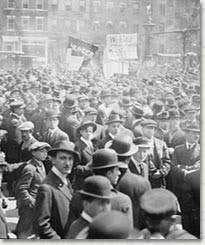LAD #30: Schenck vs. United States Case
 Due to the “mailing of printed circulars in pursuance of a conspiracy to obstruct the recruiting and enlistment service”, “an unlawful use of the mails for the transmission”, and for an “offence against the United States...to use the mails for the transmission of matter declared to be non-mailable,” Schenck was found guilty on March 3rd, 1919. Congress, stating that Schenck's documents posed as a threat and a serious danger, had a right to halt their distribution despite his first amendment right to free speech. With regards to the testimony, it was claimed that Schenck was the general secretary for the socialist party and was in charge of the headquarters from where the dangerous documents were being distributed. “The document in question upon its first printed side recited the first section of the Thirteenth Amendment, said that the idea embodied in it was violated by the Conscription Act and that a conscript is little better than a convict.” Schenck’s primary intentions were: “"Do not submit to intimidation” and “Assert your rights”. His socialist document was to prevent the draft. “It denied the power to send our citizens away to foreign shores to shoot up the people of other lands, and added that words could not express the condemnation such cold-blooded ruthlessness deserves”. Due to the fact that these were distributed in times of warfare rather than peace, they were considered to be outside of the realm of acceptable practice. “The most stringent protection of free speech would not protect a man in falsely shouting fire in a theatre and causing a panic. It does not even protect a man from an injunction against uttering words that may have all the effect of force.” Schenck obstructed the recruiting forces, that was his crime.
Due to the “mailing of printed circulars in pursuance of a conspiracy to obstruct the recruiting and enlistment service”, “an unlawful use of the mails for the transmission”, and for an “offence against the United States...to use the mails for the transmission of matter declared to be non-mailable,” Schenck was found guilty on March 3rd, 1919. Congress, stating that Schenck's documents posed as a threat and a serious danger, had a right to halt their distribution despite his first amendment right to free speech. With regards to the testimony, it was claimed that Schenck was the general secretary for the socialist party and was in charge of the headquarters from where the dangerous documents were being distributed. “The document in question upon its first printed side recited the first section of the Thirteenth Amendment, said that the idea embodied in it was violated by the Conscription Act and that a conscript is little better than a convict.” Schenck’s primary intentions were: “"Do not submit to intimidation” and “Assert your rights”. His socialist document was to prevent the draft. “It denied the power to send our citizens away to foreign shores to shoot up the people of other lands, and added that words could not express the condemnation such cold-blooded ruthlessness deserves”. Due to the fact that these were distributed in times of warfare rather than peace, they were considered to be outside of the realm of acceptable practice. “The most stringent protection of free speech would not protect a man in falsely shouting fire in a theatre and causing a panic. It does not even protect a man from an injunction against uttering words that may have all the effect of force.” Schenck obstructed the recruiting forces, that was his crime.
No comments:
Post a Comment